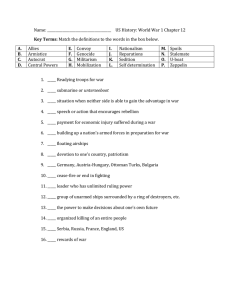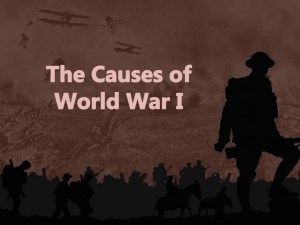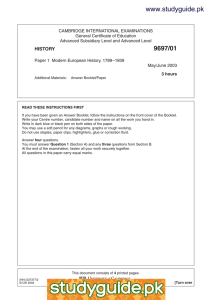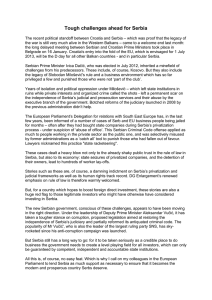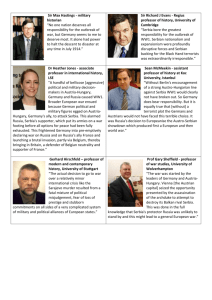CAMBRIDGE INTERNATIONAL EXAMINATIONS General Certificate of Education www.XtremePapers.com
advertisement
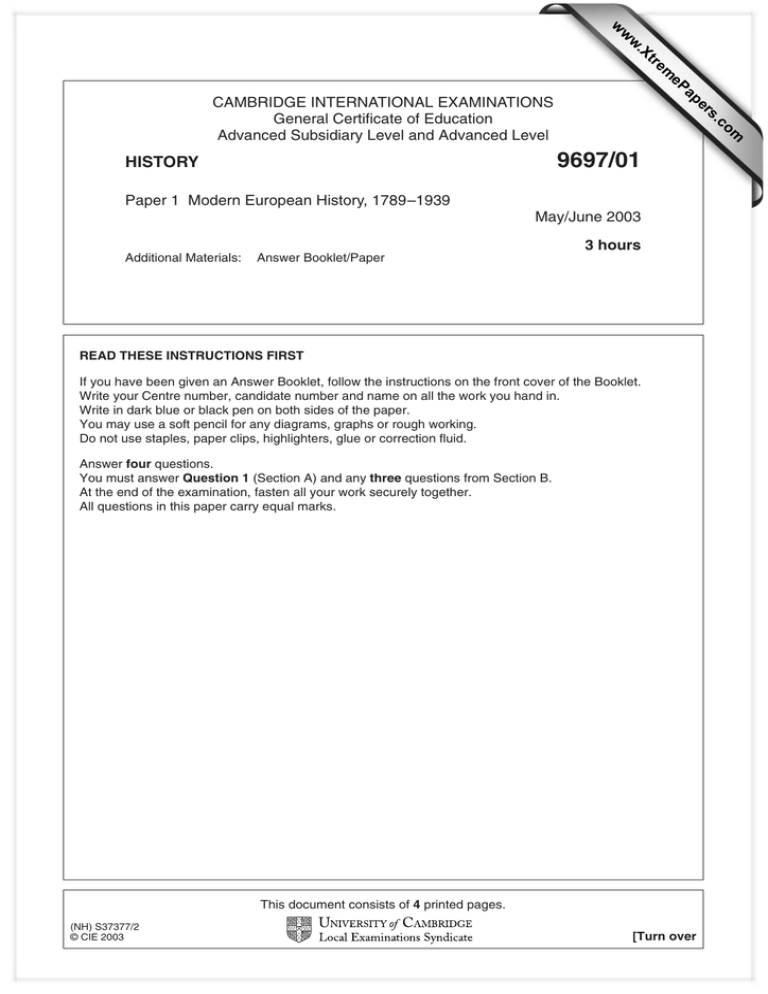
w w ap eP m e tr .X w om .c s er CAMBRIDGE INTERNATIONAL EXAMINATIONS General Certificate of Education Advanced Subsidiary Level and Advanced Level 9697/01 HISTORY Paper 1 Modern European History, 1789–1939 May/June 2003 3 hours Additional Materials: Answer Booklet/Paper READ THESE INSTRUCTIONS FIRST If you have been given an Answer Booklet, follow the instructions on the front cover of the Booklet. Write your Centre number, candidate number and name on all the work you hand in. Write in dark blue or black pen on both sides of the paper. You may use a soft pencil for any diagrams, graphs or rough working. Do not use staples, paper clips, highlighters, glue or correction fluid. Answer four questions. You must answer Question 1 (Section A) and any three questions from Section B. At the end of the examination, fasten all your work securely together. All questions in this paper carry equal marks. This document consists of 4 printed pages. (NH) S37377/2 © CIE 2003 [Turn over 2 SECTION A: The Origins of World War I, 1870–1914 You must answer Question 1. AUSTRIA AND THE BALKANS 1 Read the sources, and then answer the question. Source A The Austro-Hungarian Empire is a confused mixture. It is a state that is not a nation but a collection of nations, with different national memories and ambitions. Some of these nations occupy distinct provinces almost purely their own, and others are mixed with alien races, each with a different language. There is nothing else in the modern world that is similar to it. It violates all our ideas about what a country should be in order to have a right to exist; and it seems as though it was too disorganised to survive any length of time. Yet it has survived, much in its present shape, two centuries of storms that have swept unified countries from existence. It has lost territories in the west but gained them in the east, and the changes leave the structure as firm as ever. An article in the American magazine, Traveller’s Record, 1894. Source B Unification or Death An organisation is hereby created, for the purpose of realising the national ideals – the unification of greater Serbia, whose members may be any Serbian irrespective of sex, religion, place or birth, as well as anybody else who will sincerely serve these ideals. The organisation gives priority to the revolutionary struggle; therefore it is an absolutely secret one. It will carry out a revolutionary struggle in all the territories where Serbians are living. Beyond the frontiers of Serbia, it will fight with all means against all enemies of these ideals. Those who have joined the organisation can never leave it, nor shall anybody have the authority to accept the resignation of a member. Every member shall support the organisation by his weekly contributions. The organisation, however, shall have the authority to procure money, if need be, by coercion. The Constitution of the ‘Black Hand’ Serbian organisation, 1911. Source C The Austrian and Hungarian press are blaming Serbia more and more for the Sarajevo outrage. Their aim is obvious, to destroy that high moral reputation which Serbia now enjoys in Europe, and to take the fullest advantage politically against Serbia of the act of a young and ill-balanced fanatic. But in Serbia itself, the Sarajevo outrage has been most severely condemned in all circles of society. All groups, official as well as unofficial, immediately recognised that this outrage would be most prejudicial not only to our good neighbourly relations with Austria-Hungary but also to our fellow-Serbs in that country. It is absurd to think that Serbia could have directly or indirectly inspired acts of this kind when Serbia is doing everything in her power to improve her relations with the neighbouring AustroHungarian government. On the contrary, it was of the greatest interest to Serbia to prevent the perpetration of this outrage. Unfortunately this did not lie within Serbia’s power, as both assassins are 9697/01 M/J/03 3 Austrian subjects. Serbia has been careful to suppress anarchic elements, and after recent events she will redouble her vigilance, and will take the severest measures against them if such elements exist within her borders. Moreover, Serbia will do everything in her power to restrain unrest within her frontiers. Please use all available means to put an end as soon as possible to the anti-Serbian campaign in the European press. Despatch to all Serbian embassies from M. N. Pasic, Serbian Prime Minister and Minister for Foreign Affairs, 1 July 1914. Source D The Austro-Hungarian successor to the throne, Archduke Franz Ferdinand, and his wife were assassinated by a member of a band of Serbian conspirators. The investigation of the crime through the Austro-Hungarian authorities has proved that the conspiracy was planned in Serbia, with the cooperation of Serbian officials, and carried out with weapons from the Serbian State arsenal. This crime must have opened the eyes of the entire civilised world, not only to the aims of the Serbian policies directed against the Austro-Hungarian monarchy, but also to the criminal means which the pan-Serb propaganda in Serbia used for the achievement of these aims. Serbia has not altered its policy to Austria-Hungary in the least in spite of its repeated and solemn declarations and its promises of good and neighbourly relations. It could only do this because it believed itself supported by Russia. A statement by the German Foreign Ministry, August 1914. Source E The Serbian Government, which was obliged to maintain friendly and neighbourly relations with Austria-Hungary, permitted its press to arouse hatred against Austria-Hungary in an unprecedented way. It allowed groups in Serbia under the leadership of high officers, civil servants, teachers and judges, publicly to pursue their aims in order to stir up revolution in the territories of Austria-Hungary. This malicious agitation caused a whole series of murderous attacks, which ended in the horrific crime against the Archduke Franz Ferdinand, which had been carefully prepared in Serbia. There is no doubt that our honour, our self-respect and our deepest interest demand that we deal with the criminal conspiracies of Serbia and obtain guarantees for the security of Austria-Hungary. A statement by the Austro-Hungarian government, August 1914. Now answer the following question. ‘Austria-Hungary was not to blame for the quarrel with Serbia.’ Use Sources A-E to show how far the evidence confirms this statement. 9697/01 M/J/03 [Turn over 4 SECTION B You must answer three questions from this section. 2 How far did Napoleon Bonaparte maintain the ideals of the French Revolution during the period 1799–1815? 3 Analyse the most important differences between a pre-industrial society and an industrial society in the nineteenth century. (You should refer to developments in at least two of Britain, France and Germany in your answer.) 4 Analyse the reasons for the growth of nationalism in Europe during the period from 1815 to the unification of Germany and Italy (1870–71). 5 What was ‘new’ about imperialism in the later years of the nineteenth century? 6 ‘The First World War was the most important cause of the Russian Revolution.’ How true is this claim? 7 How similar were the methods by which Hitler and Stalin governed Germany and the USSR respectively during the 1930s? 8 Which was the greater threat to autocracy in the nineteenth century, industrialisation or political liberalism? 9697/01 M/J/03

